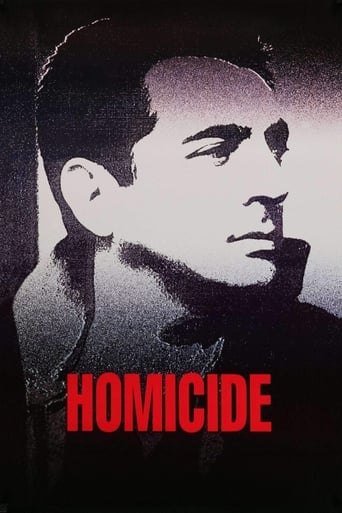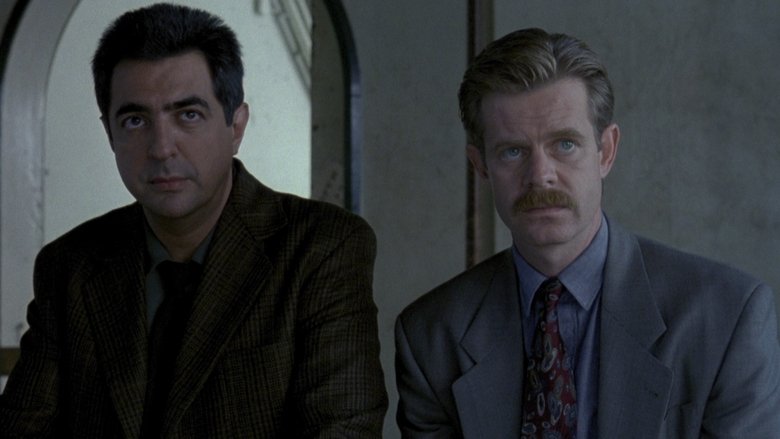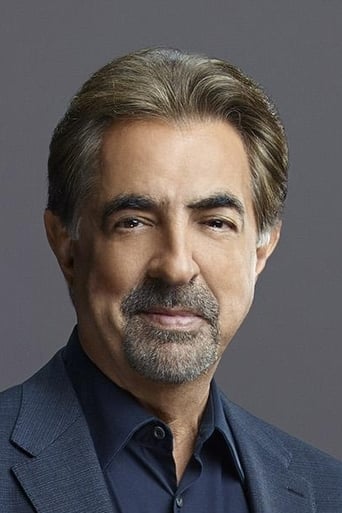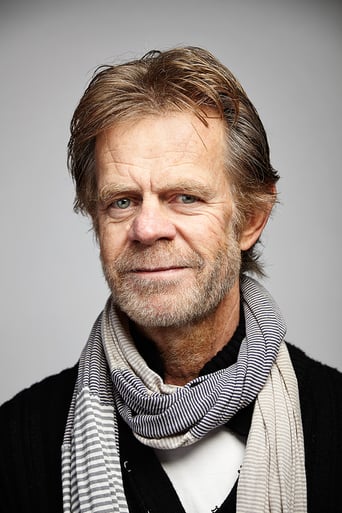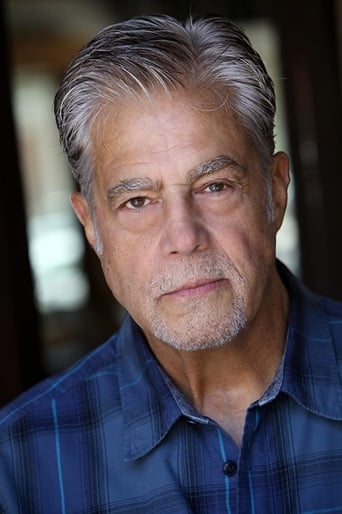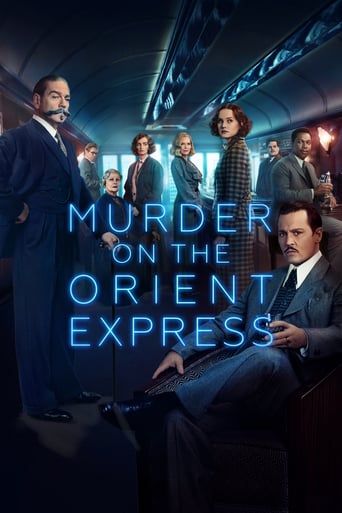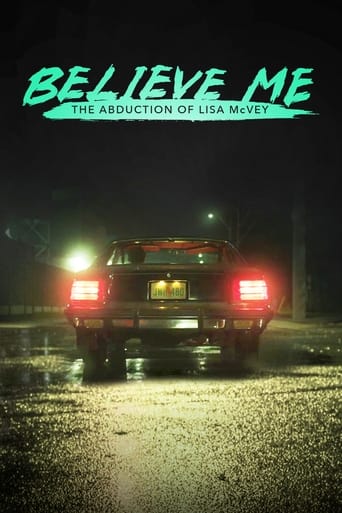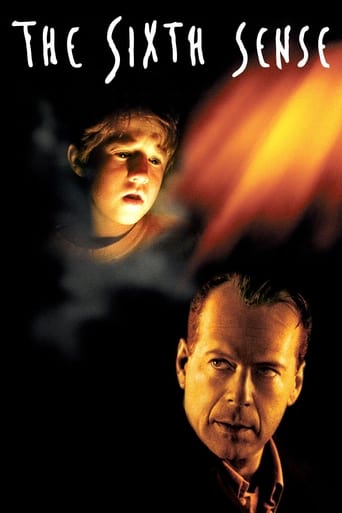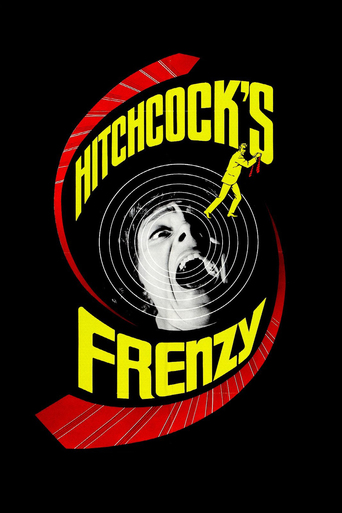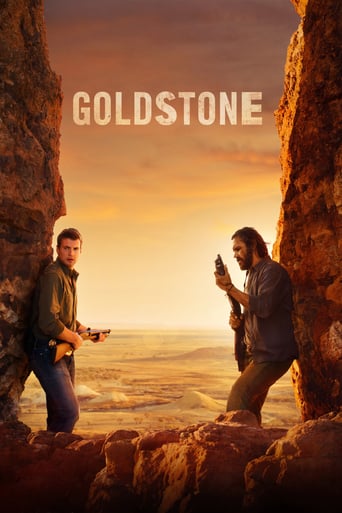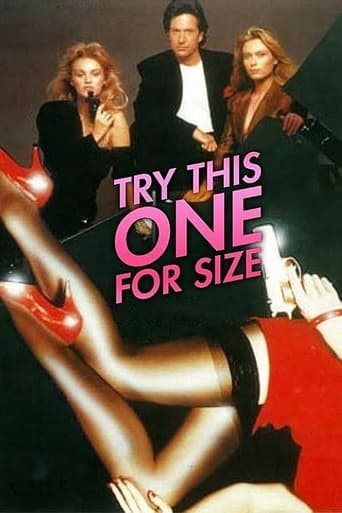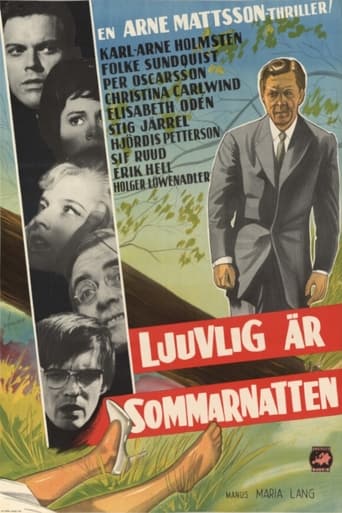Homicide (1991)
A Jewish homicide detective investigates a seemingly minor murder and falls in with a Zionist group as a result.
Watch Trailer
Free Trial Channels
Cast


Similar titles
Reviews
Fantastic!
Absolutely Fantastic
It is both painfully honest and laugh-out-loud funny at the same time.
Excellent characters with emotional depth. My wife, daughter and granddaughter all enjoyed it...and me, too! Very good movie! You won't be disappointed.
A Jewish homicide detective (Joe Mantegna, who is not Jewish) investigates a seemingly minor murder and falls in with a Zionist group as a result.I can't say I have seen all of David Mamet's films, but I have seen enough to know that he is an excellent writer of dialogue. He is a solid director, too, but it is the dialogue that sets his films apart. And this is no exception, going between a good cop story and a much deeper exploration of what it means to be Jewish. (What is the meaning of the Esther scene? I don't know.) What does it mean to be Jewish? But really, what does it mean to be anything? I can't really identify, because I am a great many different ethnicities and feel no allegiance to any one or feel that one is "who I am". Can a bloodline really define who a person is?
A professional hostage negotiator in a nameless big city police department finds more than he bargains for while investigating the murder of an elderly Jewish shop owner. David Mamet's third film is both cerebral and exciting, but for the first time his confidence as a director may have actually surpassed his skills as a writer. To his credit Mamet (as director) refuses to rely on formula technique. He doesn't, for example, lean on the crutch of music cues to generate easy suspense, most likely because the dialogue itself is Mamet's music, although the deliberate, emphatic pacing of each word might have sounded totally bogus if the script weren't so well written. But it's a pity he didn't extend the same care for language to his story as well. The tricky plot, involving issues of race hatred and cultural identity, is certainly pessimistic (in a shallow sort of way), but it doesn't add anything new to the idea that Everyone Hates Everybody Else, and the irony of the final revelation is deflated by the massive coincidence of a vital clue being revealed as an innocent scrap of waste paper.
David Mamet's "Homicide" stars Joe Mantegna as Bobby Gold, a homicide detective who is in the process of tracking down a ruthless drug dealer. As the film progresses, however, it breaks away from the crime genre and becomes a haunting examination of self-identity. Bobby, it turns out, has spent his life being bullied for his Jewish ancestry. This has led to feelings of low self worth, anxiety and isolation. As a result, Bobby joins the police force, a conscious attempt to abandon his roots and become a "public servant" of America. More insidious, though, is the implication that those persecuted for a perceived weakness themselves seek power and the authority from which to dispense violence.Believing his Jewishness to be the reason for his constant persecution, Bobby adopts a completely new persona, often swearing and insulting Jews. He abuses to fit in. But even in the police force Bobby is bullied. Alienated, he becomes a self-hating Jew, constantly trying to prove his worth and gain acceptance.The film's second act finds Bobby being given the opportunity to help an underground Zionist organisation responsible for bombing neo-Nazi sleeper cells. Unsurprisingly, he is seduced by the power and confidence these Jews exude, and wishes to join them; he seeks to symbolically reclaim his Jewish roots.Typical of Mamet, the film then reveals itself to be an elaborate con game. The Zionist organisation is merely using Bobby as a means of getting at a list hidden in police storage. They blackmail him and force him to make a choice: serve the Jews or serve the police. This, of course, is hugely subversive, especially in light of Spielberg's big Holocaust list movie released some years later.The film's final acts find Bobby being forced to choose between being dutiful to the police force (and by extension the US) and being dutiful to Israel (and by extension his ancestors). He chooses the former, but to no avail. Due to several unfortunate events, Bobby fouls a police operation, loses his partner and gets shot in the leg. He is then demoted, the film ending with Bobby shunned by the police force and bitter at being used and mismanaged by his "Jewish brothers". Without friends or family, and betrayed by the Zionist organisation, Bobby becomes further alienated; a wandering Jew, forever without country, family or roots. It's a very depressing ending.In the film, three demands are placed on Gold: to be a Jew, to understand evil and to do his job. Mamet shows that evil is the betrayal of self (the defamation of oneself in the hope of gaining recognition). In this regard, Gold's name is itself symbolic. He does not recognise his own worth, relying instead on outside validation, an act which symbolically results in "gold" turning into "mud".Elsewhere Mamet makes several parallels between conspiracies directed against the Jews and various forms of persecution against blacks. The film's title, "Homicide", is itself a pun. Here it means "death of the home".Other interesting things abound. Roger Deakins' cinematography is gorgeous and Mamet, as is typical, undermines genre conventions at every turn. He has his police hero constantly falling when doing "cool action jumps", police squad cars skid fancifully to a halt for no particular reason, dramatic showdowns occur with something as trivial as a dog and the police officers are always apologetic and polite after insulting one another. And of course, as is expected, Mamet's dialogue is a delight to listen to. It's rhythmically sloppy.In many ways this is Mamet's last film. After "Homicide" Mamet would write a book in which he explains his new philosophy of film-making. From this point onwards he would strip his films down drastically. The lighting would be flat, the dialogue would be direct, the camera work would be virtually non-existent and the music would be minimal.Consider this line from Mamet's book: "Acting should be a series of simple physical actions. If the actor wants to know how he should walk to a door in the scene, the director should tell him, 'Go to the door,' and, if the actor presses on: 'Go to the door. Quickly.' Don't act. Don't emote. No motivation. No back-story. No character arc. No discovery. These are indulgences that cannot possibly be manifested physically. Just go to the door. Quickly. Cut. Print. Go home."Mamet's new found philosophy – which he calls "heightened logic" - is important in understanding why his films are so self consciously artificial, why his stories all revolve around elaborate cons and why he directs such trashy material. On the surface, Mamet's films are all about con-jobs, but covertly, they're all about Mamet's true passion: language. Language is often – if not inherently - selfish. To talk, especially in the way that Mamet's characters talk, is to con. Stunted half sentences and droning repetitions aren't there just for the fun of it. They are successful and less successful attempts at persuasion.So thematically, Mamet's films are all about "words". Post "Homicide", however, his directing style evolved in such a way as to eradicate everything that detracts from his words. By removing music, cinematography, acting, sound etc, you've essentially cancelled out the director's "vision". And after you've cancelled out a director's "vision" and an actor's "interpretation", nothing remains but the writer's words.Another reason for the drastic change in style (post "Homicide") is Mamet's belief that neither film nor art has the power to educate audiences, change views or teach. Art, in his very pessimistic view, merely affirms the wisdom of the wise and ignorance of the ignorant. So instead of "content", Mamet's films have avoided "issues" entirely and become preoccupied with a kind of Zen like professionalism. His scripts are attempts to perfect the "word". An effort to keep on working, for no better reason than to hone one's personal skills.8.5/10 – See Melville's "Army of Shadows" and Lumet's "The Pawnbroker".
David Mamet is a very interesting and a very un-equal director. His first movie 'House of Games' was the one I liked best, and it set a series of films with characters whose perspective of life changes as they get into complicated situations, and so does the perspective of the viewer.So is 'Homicide' which from the title tries to set the mind of the viewer to the usual crime drama. The principal characters are two cops, one Jewish and one Irish who deal with a racially charged area. The murder of an old Jewish shop owner who proves to be an ancient veteran of the Israeli Independence war triggers the Jewish identity in the mind and heart of the Jewish detective.This is were the flaws of the film are the more obvious. The process of awakening is theatrical and hard to believe, the group of Jewish militants is operatic, and the way the detective eventually walks to the final violent confrontation is pathetic. The end of the film itself is Mamet-like smart, but disappoints from a human emotional perspective.Joe Mantegna and William Macy give strong performances, but the flaws of the story are too evident to be easily compensated.

